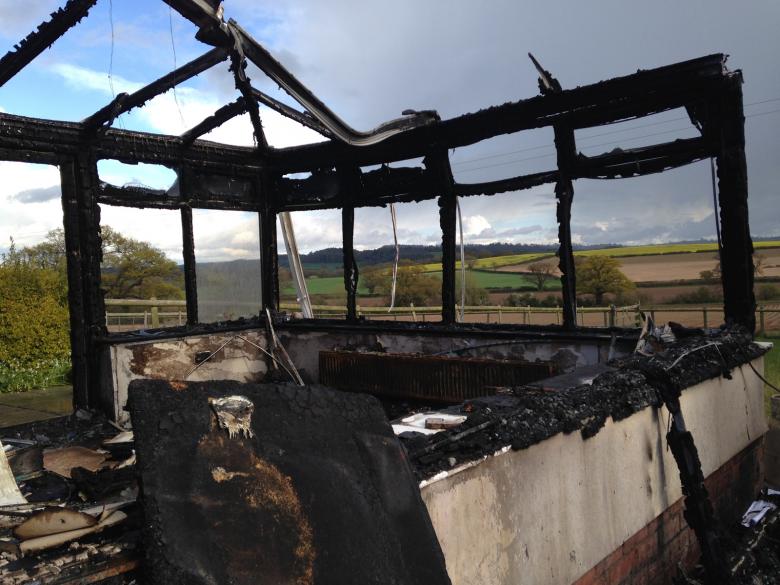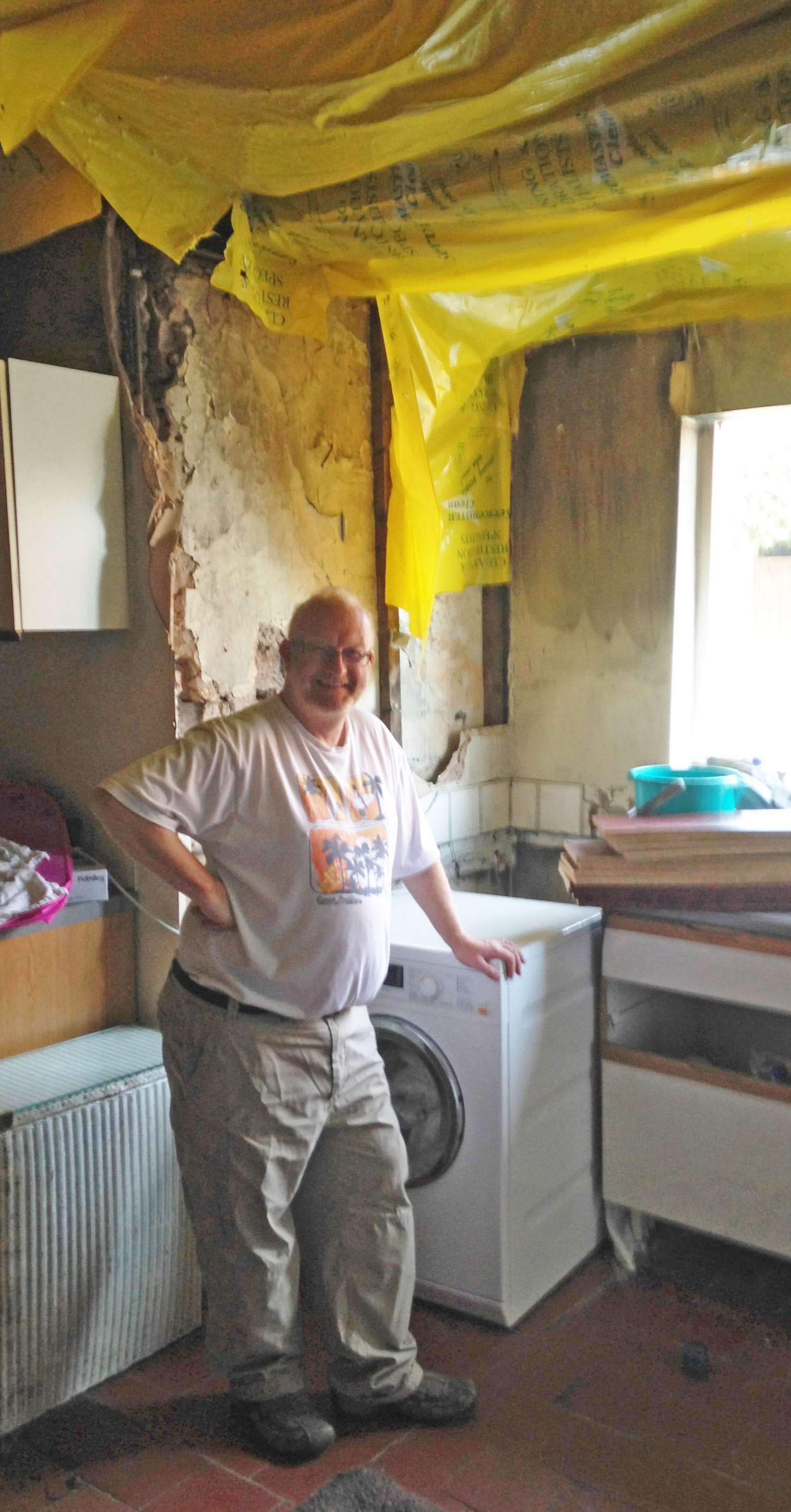
A spate of “freak” fires caused by faulty domestic machines have left Shropshire householders reeling as fire chiefs warn consumers against buying potential “killer bargains.”
Routine domestic chores have turned into nightmares for some families as dryers and washing machines caught fire, causing thousands of pounds in damage – and untold heartache for home owners.
Fire chiefs today issued a warning with a checklist of do’s and don’ts to prevent further misery after it was revealed there were an unprecedented 254 accidental domestic fires in the county in the past year. Over the past five years there have been an average of 248.
Hotel manager Margot Foster was one of 14 victims, who put the dryer on in the garage of her remote home near Cound, while she got ready for work. A few minutes later fire had spread and destroyed both the metal garage and a conservatory while melting pvc window frames in their daughter’s freshly decorated upstairs bedroom.
“If I’d put it on while everyone was asleep, God knows what would have happened,” said a shocked Margot, whose husband Adrian and 12-year-old daughter were forced to move out of their home into temporary accommodation in Much Wenlock.
“Everybody, just don’t leave them unattended. I never will now. It was a disaster waiting to happen,” added Margot, who bought her dryer online.
Businessman Geoff Williams and wife Andrea, a physiotherapist, arrived home to find a washing machine had caused £40,000 fire and smoke damage to their 20 room historic farmhouse in Edgmond, near Newport.
“They had to take the ceiling down. It was so damaged,” said Geoff (56), whose three storey home, dating back to 1745, is still under repair four months later.
The fire triggered a burglar alarm as windows cracked from the intensity of the heat. Fortunately neighbours heard the noise and used a hosepipe through a vent to put out the fire. They then got hold of a spare key to rescue the family’s two trapped pets.
“The whole house was covered in smoke. The dogs were just under the smoke cloud and were saved in time. The fire burned electric cables and damaged water and gas pipes. The cellar was under 18 inches of water.” There were also “hotspots” inside the metre thick walls.
“I just can’t believe that something metal and full of water can cause such damage. Smoke caused £30,000 damage and the fire £10,000.”
The family of six has bought two top of the range washing machines in the hope of preventing a repeat.
Both households suffering the recent devastating fires had taken sensible precautions to register for updates possibly recalling a faulty machine. They didn’t receive any. Newport firefighter, Charlie Cartwright, also suffered a tumble dryer fire which he put out in his garage.
“There were flames coming out of the back which I managed to put out. Fluff had got between the seal and into the motor and set it on fire. It just shows it can happen to anyone,” said Charlie, who gives talks on fire safety.
The rise in fires comes despite a campaign by Shropshire Fire and Rescue Service to raise awareness about the dangers. They made 3,233 fire safety visits last year to homes occupied by elderly and vulnerable people to highlight the need for smoke alarms and to check for fire safety hazards.
The majority of house fires start in the kitchen with cookers being top of the “hit list” with a recorded 86 blazes from April 2015 to the end of March 2016. Second came tumble dryers and washing machines (28) equally divided at 14 fires each; followed by faulty cables (20); toaster and grills (19); microwaves (18) and heating devices (13). Candles, cigarette lighters, dishwashers, fridge freezers, computer equipment and hair dryers caused the remainder.
John Das Gupta, Head of Area Command at Shropshire Fire and Rescue Service, has led the campaign to reduce the number of fires.
“We aim to reduce domestic fires by 20 per cent in five years from an average of 248 a year down to 186. It is a massive challenge and we have failed so far in reaching the target.”
A rise in single households, more over 65’s living alone and an increase in internet shopping to buy cheaper “white goods” may be partly to blame. Fires in washing machines and dryers have increased massively from five to 28, he said.
There has also been an increase in computers “in every room” with cheap electrical chargers, overloaded sockets and frayed wiring causing fires.
He urged people as a “matter of urgency” to visit www.electricalsafetyfirst.org.uk for a list of do’s and don’ts. Elderly and vulnerable householders can call Shrewsbury fire HQ on 01743 260200 for a free home fire safety check. Follow Shropshire firefighters on Facebook and Twitter for regular fire safety updates.
Fire safety advice to householders: It’s not only electrical faults that start fires, human error is often to blame. Whether it’s a badly wired plug or an iron left on – we all need to take more care.
Do:
Check the condition of your wiring – This should be done when you move into a new home and then once every 10 years. It’s the landlord’s responsibility if you rent your home. Ask to see a copy of the certificate or report confirming that the electrics meet the UK national standard BS 7671 (Requirements for Electrical Installations).
Check your sockets regularly – if you see burn marks or they feel hot, get a registered electrician to check them.
Turn off any electrical equipment you are not using – especially at night, when a fire can spread quickly while you sleep.
Regularly check flexible cables on kettles and other similar appliances – look for signs of fraying, general wear and tear, or a loose plug. Do this before you plug anything in.
Be careful when using hand-held electrical equipment – make sure you switch off and unplug when you have finished. This is important with items that get hot, for instance hairdryers or curling tongs, as they may come into contact with materials that can catch fire (like curtains).
Check the current rating of an electrical adaptor before you plug appliances in – make sure that the total current used does not exceed the adaptor’s rating.
Call the Fire and Rescue Service immediately if you smell burning that cannot be explained. They will have equipment such as thermal imaging cameras which will accurately detect objects that are overheating.
Don't:
Overload any adaptor or socket – especially with appliances that have a high electrical current such as kettles, irons or heaters. It’s safer to have extra sockets installed if needed.
Put electric heaters near curtains or furniture – or dry clothes on them.
Cover the air vents on storage heaters or fan heaters.
Trail flexible cables under carpets or rugs.
Exceed the wattage of the light fitting or lampshade with the bulb you use.
Cover the air vents on storage heaters or fan heaters.
Store combustible materials (clothes, papers, cleaning materials etc) close to your service head (cut-out fuse), electricity meter or fusebox.
Don’t let leads from kettles, toasters or similar, trail across your cooker.
Never dry towels on, or near, the cooker.
Don’t let fat and grease build up, especially in the cooker’s grill pan, as it can catch fire easily.
Make sure you turn the cooker off when you have finished.
Data supplied by the Department of Communities and Local Government





